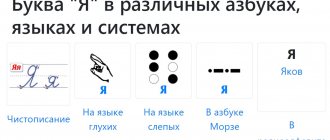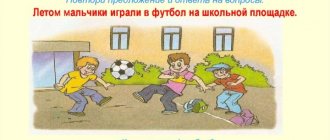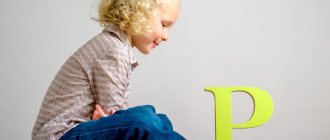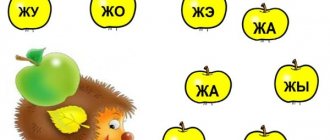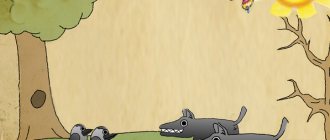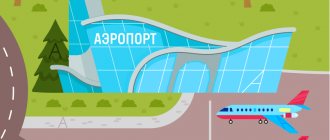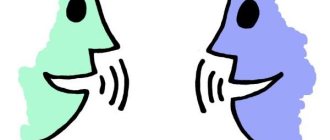www.Logopedy.ru
The articulatory apparatus (active organs of which are the tongue, lips, lower jaw, soft palate; passive organs - teeth, upper jaw, hard palate) and the voice-forming apparatus - vocal folds - take the main part in the formation of sounds.
Classification of sounds according to the absence or presence of an obstruction in the oral cavity:
vowels – [a], [e], [i], [s], [o], [u];
consonants - all the rest.
Classification of sounds according to their participation in the articulation of the soft palate:
nasals – [m], [m'], [n], [n'];
oral - all the rest.
Classification of sounds according to the functioning of the vocal folds:
vowels – [a], [e], [i], [s], [o], [u];
sonorous – [th], [m], [m'], [n], [n'], [l], [l'], [r], [r'];
voiced – [v], [v'], [z], [z'], [g], [b], [b'], [d], [d'], [g], [g'] ;
deaf – [f], [f'], [s], [s'], [sh], [p], [p'], [t], [t'], [k], [k'] , [x], [x'], [h], [sch].
Classification of consonant sounds according to the method of formation:
stop plosives – [p], [p'], [b], [b'], [t], [t'], [d], [d'], [k], [k'], [ g], [g'];
occlusive passages – [m], [m'], [n], [n'], [l], [l'];
fricatives (fricatives) – [f], [f'], [v], [v'], [s], [s'], [z], [z'], [w], [zh], [ ь], [th], [x], [x'];
occlusive fricatives (affricates) – [ts], [h];
trembling (vibrants) – [р], [р'].
Classification of consonant sounds by place of formation:
labiolabial – [p], [p'], [b], [b'], [m], [m'];
labiodental – [f], [f'], [v], [v'];
anterior lingual: tip of the tongue at the top – [t], [d], [n], [l], [l'], [r], [r'], [w], [w], [sch], [h ]; tip of the tongue below – [t'], [d'], [n'], [s], [s'], [z], [z'], [c];
middle language – [th];
back-lingual – [k], [k'], [g], [g'], [x], [x'].
Classification of consonant sounds according to the degree of tension in the middle part of the back of the tongue:
soft – [th], [sch], [h], [t'], [d'], [n'], [b'], [v'], [g'], [s'], [ p'], etc.;
solid – [w], [g], [c], [t], [d], [n], [b], [c], [g], [s], [r], etc.
Classification of vowel sounds according to the degree of elevation of the tongue in the oral cavity:
upper rise – [i], [s], [y];
average rise – [e], [o];
lower rise – [a].
Classification of vowel sounds according to their participation in the articulation of different parts of the tongue:
front vowels – [i], [e];
middle vowels – [s], [a];
back vowels – [u], [o].
Classification of vowel sounds taking into account labialization:
labialized – [o], [y];
non-labialized – [i], [e], [s], [a].
Do you like the article? Tell your friends!
Thus, it is clear that all sounds of the Russian language are interconnected and interdependent. A speech therapist must have a good knowledge of the phonetic system of the native language in order to decide in each individual case where to start and what to rely on when working to form or clarify the pronunciation of any sound.
Basics of speech therapy with sound pronunciation workshop
Ed. T.V. Volosovets. – M.: Academy, 2002.
| If you liked this article, share the link to the article with your friends and acquaintances on social media. networks using this button | If you have your own special opinion about the material presented, leave your comment in the form below |
Social commentary Cackle
Distinguishing oppositional phonemes by ear based on words
Instructions:
“If I name the picture correctly, clap your hands; if I name it incorrectly, don’t clap.” Pictures: sled, hat, old lady, chick.
| Suggested material | Answers |
| Beginning of the year | The end of the year |
| Shanky - funky - syanky - sled - tanks | |
| Slyapa - shyapa - flyapa - hat | |
| Ftarufka - old woman - staluska - old woman - old woman | |
| Little bird - little bird - little bird - little bird - little bird |
Rating: 5 points
— all tasks were completed correctly;
4 points
- some tasks are completed with an error, but the error is corrected independently;
3 points
- errors are corrected after replay;
2 points
- some tasks are inaccessible and require replay when completed;
H point
- failure.
Studying the differentiation of sounds in pronunciation
Series "A". Repetition of popular words.
| Mixable sounds | Suggested pairings | Beginning of the year | The end of the year |
| Sh-S | Teddy bear - bowl | ||
| J-W | faces - roses | ||
| WHAT | bangs - chick | ||
| Ts-S | heron saber | ||
| S-h | helmet - pitching | ||
| Ch-Shch | bangs - slit | ||
| L-Y | pebble-nut | ||
| L-L | jackdaw - pebble | ||
| R-L | cancer - varnish | ||
| R-Y | brand - T-shirt | ||
| RH-I | sailor - lighthouse | ||
| P-B | kidney - barrel | ||
| T-D | wheelbarrow - dacha | ||
| K-G | bones - guests | ||
| Y-I | mouse - bear | ||
| NW | braids - goats |
Series "B". Repetition of phrases:
| Suggested material | Answers |
| Beginning of the year | The end of the year |
| The older brother was telling a scary story. | |
| The old woman was drying her fluffy fur coat. | |
| The river flows, the stove bakes. | |
| Julia dropped the porcelain saucer. | |
| A seagull is different from a heron. | |
| Sonya has seven flowers. | |
| It's terrible for a beetle to live on a bitch. | |
| Mice lived in the house. |
Score for task 4 (“A”, “B”): 5 points
— all tasks were completed correctly;
4 points
- there are isolated errors that are corrected independently, the task is completed at a slightly slower pace;
3 points
, the task is completed at a slow pace, there are many errors, some errors are corrected independently, some tasks are inaccessible;
2 points
- tasks are completed with errors, most tasks are unavailable;
1 point
- inadequate answers, refusal to complete.
Direction 7
Studying the formation of syllable structure and sound content of words.
Reflected word recall
Instructions:
“Listen and repeat after me.
| Suggested material | Answers |
| Beginning of the year | The end of the year |
| Hippopotamus | |
| Pine | |
| Tankman | |
| Draft | |
| Medicine | |
| Pan | |
| Thermometer | |
| little penguin | . |
| I'm taking pictures |
Grade:
5 points
- all words are accurately reproduced;
4 points
- most words are reproduced accurately, but the pace of reproduction is somewhat slow, there may be stutters;
3 points
- words are reproduced at a slow pace, with hesitations, 1-2 words with distortion of the syllable structure;
2 points
- most words are reproduced with distortion of the syllable structure, repeated presentation of the material is required;
1 point
- refusal to complete, inadequate answers
2. Reflected phrase playback
Instructions:
“Listen to the sentence and repeat exactly as I did
».
| Suggested material | Answers |
| Beginning of the year | The end of the year |
| The hockey players won the tournament. | |
| Larisa knitted a jumper for her brother. | |
| In the morning swallows chirped in the trees. | |
| Sasha returns from work in transport. | |
| Mom buys fruit at the supermarket. |
Grade:
5 points
— all phrases are accurately reproduced;
4 points
- basically all phrases are reproduced accurately, with a slightly reduced tempo and hesitation;
3 points
are noted for distortion of the syllabic structure of words, substitution of words, distortion of the structure of sentences without distortion of meaning;
2 points
- numerous distortions of the syllabic structure of words, sentence structure, both without distortion of meaning and with distortion, repeated presentation of the material is required;
1 point
—refusal to activity, inadequate answers.
Direction 8
Learning phonemic analysis skills.
Task 1. Instructions:
“Listen to how I pronounce the sounds: A, O, M, U, S, R, I (pronounced with exaggerated articulation). Let’s play a game: I will pronounce different sounds, and you clap your hands only if you hear the sound A.”
| Suggested material | Answers |
| Beginning of the year | The end of the year |
| a, o, p, y, a, i, m, e, a, s; | |
| pa, oh, aw, ma, you, ah , uh; | |
| Alik, beetle, horse, poppy, nose, winter, juice. |
Task 2. Instructions:
“I made a lot of sounds, and you say one sound.”
| Answers | |
| Beginning of the year | The end of the year |
| Suggested material | Answers |
| Beginning of the year | The end of the year |
| Remember and name the first sound: A, O, U | |
| Remember and name the last sound: O, T. M |
Task 3. Instructions:
“Let's play a game. Guess who's standing first and who's last. (The experimenter offers to choose from three toys placed in a row in front of the child; swaps the toys, and the game is repeated). And now I will make different sounds. I will say them in order: first the first one, then the other one, and finally the last one. So, I’ll name three sounds, and you...”
Task 4 Instructions :
“I’ll say the word, and you...” (Pronounces the word with exaggerated articulation).
| Suggested material | Answers |
| Beginning of the year | The end of the year |
| remember and name the first sound: in the word “Olya” | |
| remember and name the last sound: in the word “cat” |
Task 5. Instructions:
“Tell me, how many sounds are in the word “poppy”?”
| Beginning of the year | The end of the year |
This task is offered to children over 5 years old.
Score for tasks No. 1, 2, 3, 4, 5: 5 points
— all tasks were completed correctly;
4 points
- basically all tasks were completed correctly, errors were corrected independently or with the help of a clarifying question;
3 points
- tasks are completed with errors, which are corrected with the help of an adult, the pace of completion is slow, one or two tasks are inaccessible even with help;
2 points
- significant assistance from an adult is required when completing; some tasks are inaccessible even after using the “sample analysis” technique;
1 point
- inadequate answers, refusal to complete.
Direction 9
Study of connected speech
The development of the proposed materials was carried out based on the research of R. I. Lalaeva (1998); G.A. Volkova (1993); ON THE. Tsypina (1994). 1. Retelling of an adapted text of a narrative nature. (The text “Ducklings” is used from the manual by M.I. Omorokova, 1999). 1.1. Brief introductory conversation on issues
· Who has what kind of mother? (Chicks..., ducklings...).
· What do chickens hatch from? What about the ducklings?
· Who hatches chicken eggs? What about duck ones?
· How do you understand the phrase “hatch eggs”?
· Who can swim: chicken or duck, chickens or ducklings?
1.2. Reading a story .
One housewife wanted to raise ducklings, but she didn’t have a duck, she only had a chicken. The hostess bought duck eggs, put them in a basket and sat the chicken on them. The hen hatched the ducklings. She was happy and taught the children how to dig up worms. One day, a chicken took the children to the shore of a pond. The ducklings saw the water and rushed into it. The poor hen got excited, she ran along the shore and screamed, but the ducklings did not even think of going ashore. They swam happily in the water.
